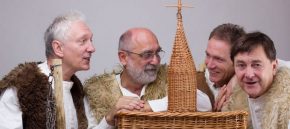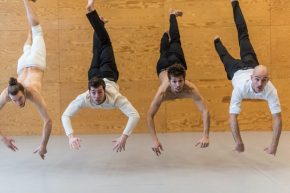Secrets behind the concert videos we can see at home – interview with the creative director of Müpa Studio
Müpa Studio is unique in its kind, it requires the teamwork of many colleagues. This is one secret behind the success of the Müpa.
Müpa Studio is unique in its kind, it requires the teamwork of many colleagues. This is one secret behind the success of the Müpa.
I had also always wanted to make a desktop-based performance, and the pandemic suddenly made a space for such works – Oliver Zahn says.
My music might be unusual, but Flesh still has similar elements to a traditional opera – says composer-director Franck Vigroux.
The company rehearsed in complete isolation, and their puppet polar bear almost fell victim of the border closure. Interview with Bence Vági.
Godofredo Alves one day finds his business partner having seduced his wife. And not anywhere but exactly on the YELLOW SOFA, which was a gift to her!
The 29th CAFe Budapest Contemporary Arts Festival is going to launch on the 9th of October. At a recent press…
This year, due to the extraordinary situation, the “Bayreuth on the Banks of the Danube”, the 15th Budapest Wagner Days, will be a virtual festival.
Müpa brings superstars in our homes in the time of quarantine – but let us hope that we can soon return to concerts that are a real community experience.
I consider it a continuous process and with Girls in particular there has been a sense of great discovery over the past year – Roy Assaf recalls.
There are four instruments in Bach’s work: flute, cello, bass clarinet and violin, and each is represented by a human body. ‘Opus’, performed in the Trafó.

A family concert, a hot chocolate, and a few rounds of skating surely help us all to get in Christmas mood. Come to the Müpa Winter Open Air!

It will work out very well in Trafó to awake feelings with the mere method of looking at people – says Alexander Vantournhout.
For “Coexist”, Hód, along with her company Hodworks, and Bremen based dance company Unusual Symptoms collaborate with each other for the first time.
Rau uses the biography of the Belgium’s most notoriously shameful criminal to reflect on (re)presentation of human feelings on stage.
By continuing to use the site, you agree to the use of cookies. more information
The cookie settings on this website are set to "allow cookies" to give you the best browsing experience possible. If you continue to use this website without changing your cookie settings or you click "Accept" below then you are consenting to this.